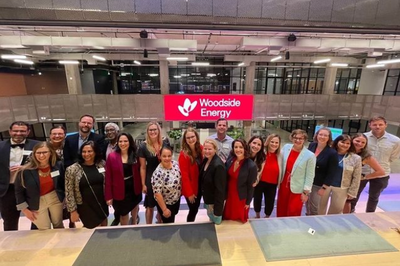howdy, partner
Woodside Energy backs $12.5M clean energy accelerator for new technologies

Woodside Energy has committed $12.5 million to a new partnership with Rice University. Photo via Instagram/WoodsideEnergy
A global Australian energy company with its international operations in Houston has backed a new climatetech accelerator in partnership with Rice University.
Woodside Energy, headquartered in Australia with its global operations in Houston following its 2022 acquisition of BHP Group, has committed $12.5 million over the next five years to create the Woodside Rice Decarbonization Accelerator.
"The goal of the accelerator is to fast track the commercialization of innovative decarbonization technologies created in Rice labs," Rice University President Reginald DesRoches says to a crowd at the Ion at the initiative's announcement. "These technologies have the potential to make better batteries, transitistors, and other critical materials for energy technologies. In addition, the accelerator will work on manufacturing these high-value products from captured and converted carbon dioxide and methane."
"The Woodside Rice Decarbonization Accelerator will build on the work that Rice has been doing in advanced materials, energy, energy transition, and climate for many years. More than 20 percent of our faculty do some related work to energy and climate," he continues. "Harnessing their efforts alongside an esteemed partner like Woodside Energy is an exciting step that will undoubtedly have an impact far and wide."
Woodside, which has over 800 employees based in Houston, has been a partner at the Ion since last spring. Daniel Kalms, Woodside Energy's CTO and executive vice president, explains that the new initiative falls in line with the three goals of Woodside's climate strategy, which includes keeping up with global energy demand, creating value, and conducting its business sustainably. The company has committed a total of $5 billion to new energy by 2030, Kalms says.
"We know that the world needs energy that is more affordable, sustainable, and secure to support the energy transition — and we want to provide that energy. Energy that is affordable, sustainable, and secure requires innovation and the application of new technology. That's what this is about," he says.
"Of course collaboration will be the key," Kalms continues. "By working with researchers, entrepreneurs, leading experts and parallel industries, we can combine our capability to solve collective challenges and create shared opportunities. That's why we are excited to be partnering with Rice."
The accelerator will be run by Paul Cherukuri, vice president of innovation at Rice University, and Aditya Mohite, associate professor of Chemical and Biomolecular Engineering and Materials Science and Nanoengineering. Additional Rice professors will be involved as well, Cherukuri says.
"Success for us will not be papers, it will be products," Cherukuri says of what Woodside wants from the partnership. "We picked faculty at Rice in particular who were interested in taking on this charge, and they were all faculty who created companies."
Last fall, Rice announced a grant and venture initiative to accelerate innovation from Rice in the biotech space.
------
This article originally ran on InnovationMap.